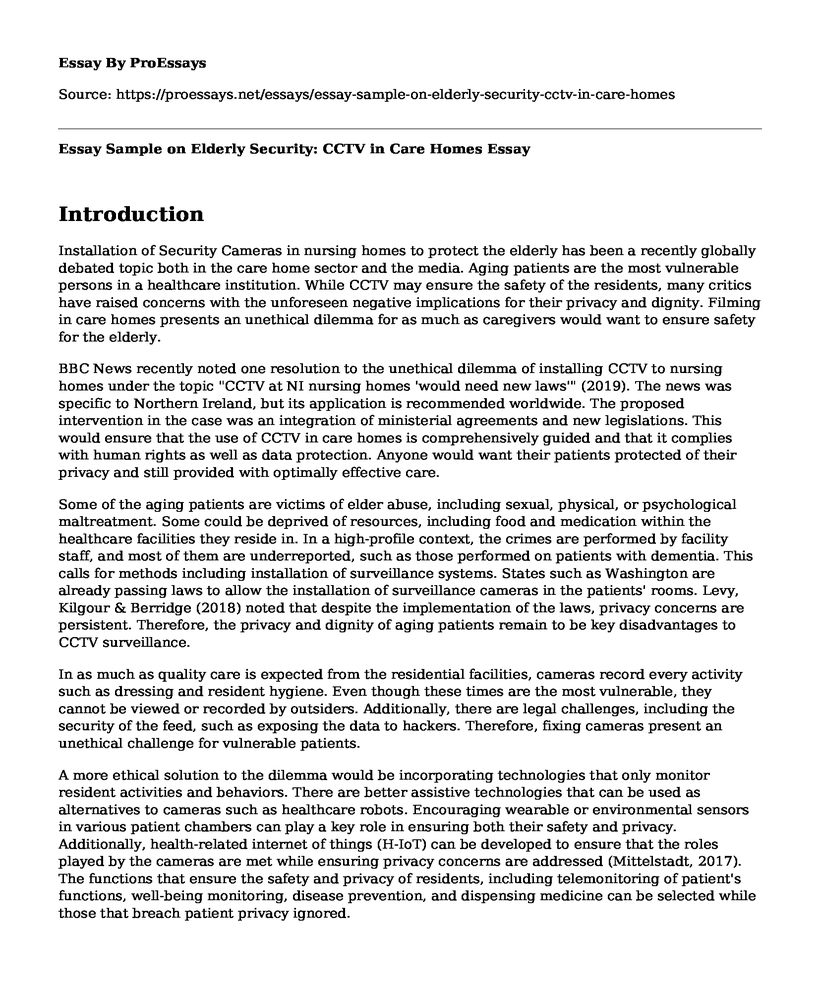Introduction
Installation of Security Cameras in nursing homes to protect the elderly has been a recently globally debated topic both in the care home sector and the media. Aging patients are the most vulnerable persons in a healthcare institution. While CCTV may ensure the safety of the residents, many critics have raised concerns with the unforeseen negative implications for their privacy and dignity. Filming in care homes presents an unethical dilemma for as much as caregivers would want to ensure safety for the elderly.
BBC News recently noted one resolution to the unethical dilemma of installing CCTV to nursing homes under the topic "CCTV at NI nursing homes 'would need new laws'" (2019). The news was specific to Northern Ireland, but its application is recommended worldwide. The proposed intervention in the case was an integration of ministerial agreements and new legislations. This would ensure that the use of CCTV in care homes is comprehensively guided and that it complies with human rights as well as data protection. Anyone would want their patients protected of their privacy and still provided with optimally effective care.
Some of the aging patients are victims of elder abuse, including sexual, physical, or psychological maltreatment. Some could be deprived of resources, including food and medication within the healthcare facilities they reside in. In a high-profile context, the crimes are performed by facility staff, and most of them are underreported, such as those performed on patients with dementia. This calls for methods including installation of surveillance systems. States such as Washington are already passing laws to allow the installation of surveillance cameras in the patients' rooms. Levy, Kilgour & Berridge (2018) noted that despite the implementation of the laws, privacy concerns are persistent. Therefore, the privacy and dignity of aging patients remain to be key disadvantages to CCTV surveillance.
In as much as quality care is expected from the residential facilities, cameras record every activity such as dressing and resident hygiene. Even though these times are the most vulnerable, they cannot be viewed or recorded by outsiders. Additionally, there are legal challenges, including the security of the feed, such as exposing the data to hackers. Therefore, fixing cameras present an unethical challenge for vulnerable patients.
A more ethical solution to the dilemma would be incorporating technologies that only monitor resident activities and behaviors. There are better assistive technologies that can be used as alternatives to cameras such as healthcare robots. Encouraging wearable or environmental sensors in various patient chambers can play a key role in ensuring both their safety and privacy. Additionally, health-related internet of things (H-IoT) can be developed to ensure that the roles played by the cameras are met while ensuring privacy concerns are addressed (Mittelstadt, 2017). The functions that ensure the safety and privacy of residents, including telemonitoring of patient's functions, well-being monitoring, disease prevention, and dispensing medicine can be selected while those that breach patient privacy ignored.
Conclusion
Installation of cameras in care homes presents an unethical dilemma because resident private information is unintendedly leaked. Various CCTV alternatives can be used effectively in the settings, including wearable or environmental sensors, and H-IoT. These alternatives are cheap to install and move with the current shift in technology, making it easier even for medical tasks such as dose administration. An application of alternatives that address issues pertaining to safety and privacy ensure that ethics are well integrated into healthcare.
References
BBC News. (2019). CCTV at NI nursing homes 'would need new laws.' Retrieved from https://www.bbc.com/news/uk-northern-ireland-49425244
Levy, K., Kilgour, L., & Berridge, C. (2018). Regulating privacy in public/private space: the case of nursing home monitoring Laws. Elder LJ, 26, 323.
Mittelstadt, B. (2017). Ethics of the health-related internet of things: a narrative review. Ethics and Information Technology, 19(3), 157-175.
Cite this page
Essay Sample on Elderly Security: CCTV in Care Homes. (2023, Feb 06). Retrieved from https://proessays.net/essays/essay-sample-on-elderly-security-cctv-in-care-homes
If you are the original author of this essay and no longer wish to have it published on the ProEssays website, please click below to request its removal:
- Paper Example on Minors and Social Networks
- Research Paper on Conscientiousness and Agreeableness Personality Traits on Nursing Leadership
- Essay on Weight Loss Intervention for Obese and Overweight Children and Adolescents
- Essay Example on Nurse Burnout: A Global Professional Challenge Affecting Patient Safety
- Nursing: From Female-Dominated to Gender-Neutral Profession - Essay Sample
- Essay Example on Modern Health Care: Neglect of Nursing Management?
- Essay Example on Food Epidemiology







